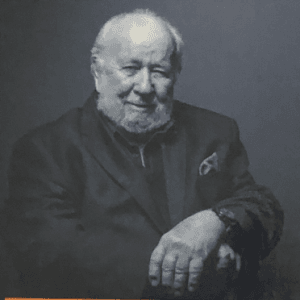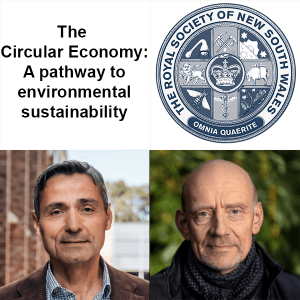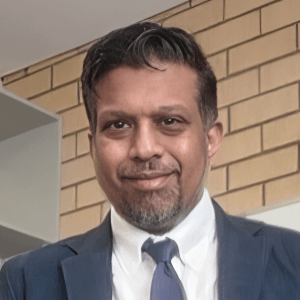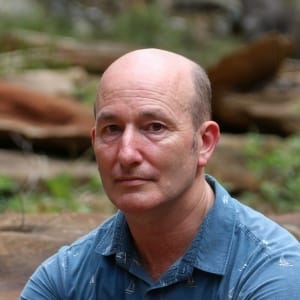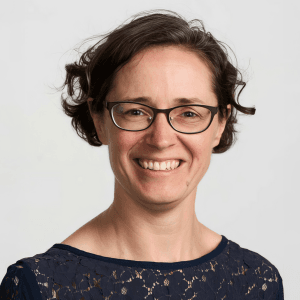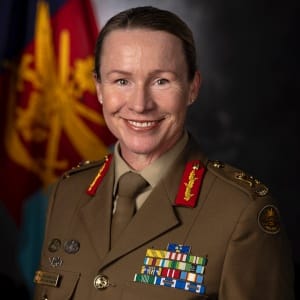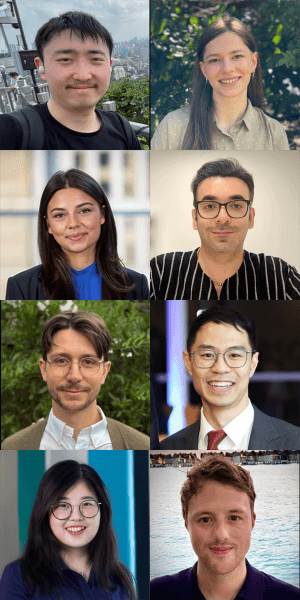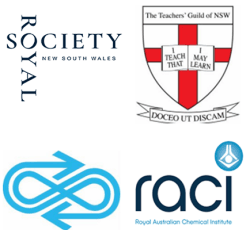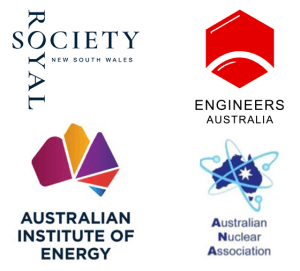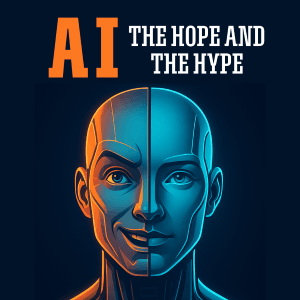
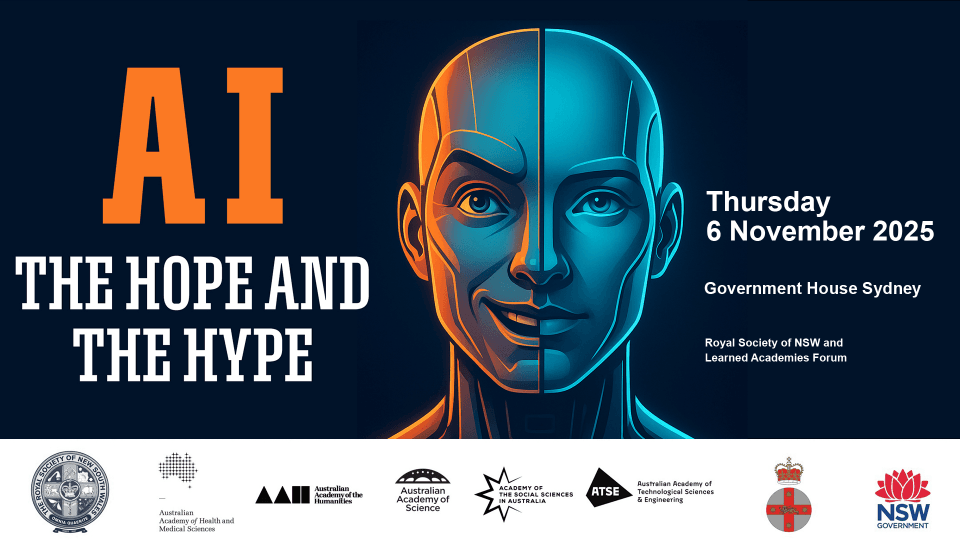
Date: Thursday, 6 November 2025, 8.30 am for 9.00 am – 5.00 pm AEDT
Venue: Government House, Sydney: in person by invitation, and live-streaming
Program: Brochure (5 MB pdf)
Video presentations: YouTube playlist
Forum archive: Archive page
Entry: No charge
The Forum is held under the auspices of Her Excellency the Honourable Margaret Beazley AC KC, Governor of New South Wales. The Royal Society of New South Wales acknowledges the generous support of Her Excellency and the Office of the NSW Chief Scientist and Engineer.
SUMMARY
Artificial intelligence today sits at the crossroads of grand hopes and rampant hype. Optimists point to extraordinary investments—tech giants like Microsoft, Amazon, Meta, and Alphabet pumping hundreds of billions of dollars into AI infrastructure—as catalysts for growth and efficiency. In the U.S., AI-driven capital expenditures in the second quarter of this year accounted for nearly half of that quarter’s 3% GDP gain. McKinsey forecasts an astonishing $7 trillion in global AI investment over the next 5 years, fueling narratives of transformative potential.
This wave of optimism has also reached Australia. Political leaders—including Treasurer Jim Chalmers— note “We see AI as a huge opportunity for Australia, it’s a key part of our productivity agenda, an absolute game changer”, aligning with Productivity Commission projections of AU$116 billion in gains over the next decade and a 4.3 percentage‑point boost in labour productivity. This marks a significant shift from the earlier priority on safe, ethical deployment to one of economic opportunity.
This shift extends beyond Australia. In the United Kingdom, the new Labour government’s AI Opportunities Action Plan—backed by £14 billion in private-sector investment—marks a clear pivot from previous safety-centred messaging to one emphasising “opportunity and growth.” However, history offers a cautionary note—productivity gains are rarely distributed evenly. A recent Nature paper, Bridging the Digital Divide, examined data from 59 countries over 25 years and found that while technological innovation can enhance connectivity and efficiency, it has often exacerbated income inequality, especially in developed economies.
And then there is the question of whether these forecast productivity gains are realistic. Many economists urge caution. Torsten Sløk, Apollo’s chief economist, warns the AI bubble may rival the 1990s dot‑com boom, while Nobel laureate Daron Acemoglu estimates AI may automate only 5% of jobs and contribute approximately 1% to global GDP this decade, a non-trivial but modest effect, and certainly much less than the revolutionary changes some are predicting. Emily M. Bender’s The AI Con also challenges techno‑optimism by characterising many AI systems as “sophisticated illusions” that mimic understanding without genuine comprehension, underpinned by invisible labour and structural inequality.
A more balanced view is given by Narayanan and Kapoor, in AI as Normal Technology, urging us to understand AI as akin to electricity or the internet—transformative but gradual, institutionally mediated—not as a sudden rupture, tempering both utopian and apocalyptic visions.
This evolving discourse on AI’s impact is at the heart of the upcoming Royal Society of NSW Forum Day: “AI: The Hope and The Hype.” The event’s sessions, AI in Communities, AI for Health, AI and the Law, AI in Practice, and AI Research & Future Directions, offer a timely platform to explore how AI’s promise intersects with productivity, equity, governance, and societal impact.
At its core, the tension remains between hype — exuberance untethered from evidence, and hope — grounded optimism shaped by governance, ethics, and fairness. As we confront this new technology, a critical question emerges: Is AI truly different from previous transformative technologies—like electricity or the internet—or is it simply another innovation riding waves of hype?
OPENING SESSION
| Time | |
| Registration and Guests seated | |
| 9.00–9.10 am | Official Opening Her Excellency the Honourable Margaret Beazley AC KC Governor of New South Wales |
| 9.10–9.15 am | Welcome and Acknowledgements Emeritus Professor Christina Slade FRSN FRSA President and Forum Chair Royal Society of NSW |
| 9.15–9.25 am | Introductory Address The Hon. Victor Dominello CEO, Future Government Institute and Former NSW Minister for Customer Service and Digital Government |
KEYNOTE SESSION
Chair: Professor Sally Cripps FRSN
Director, Technology, Human Technology Institute
University of Technology Sydney
Forum Program Chair
| 9.25–10.00 am | Professor Pascal Van Hentenryck FAAAI A. Russell Chandler III Chair and Professor H. Milton Stewart School of Industrial and Systems Engineering Georgia Institute of Technology |
SESSION 1: AI AND THE LAW
Chair: Emeritus Professor Rosalind Croucher AM FRSN FAAL
Information Commissioner and CEO
NSW Information and Privacy Commission
| 10.00–11.00 am | The Hon. Dr Annabelle Bennett AC SC Retired Judge, Federal Court of Australia |
| The Hon. Justice Melissa Perry FAAL Federal Court of Australia | |
| Professor Lyria Bennett Moses FRSN FASSA FAAL School of Law, Society and Criminology Faculty of Law and Justice UNSW Sydney |
MORNING TEA (11.00–11.30 am)
SESSION 2: AI IN COMMUNITIES
Chair: Professor Sally Cripps FRSN
Forum Program Chair and
Director, Technology, Human Technology Institute
University of Technology Sydney
| 11:30–12.30 pm | Professor Jill Bennett Scientia Professor and Australian Research Council Laureate Fellow UNSW Sydney |
| Dr Stephen Hardy Partner Bain & Company | |
| Dan Hart General Manager AI University of Sydney | |
| Jacky Hodges Chief Data Officer and co-Chief AI Officer NSW Department of Education |
SESSION 3: AI IN HEALTH
Chair: Professor Michael Blumenstein FRSN FACS
Pro Vice Chancellor (Business Creation and Major Facilities)
University of Technology Sydney
| 12.30–1:30 pm | Dr Sean Baldwin Deputy Chief Medical Information Officer for Northern Sydney LHD NSW Health |
| Dr Simon Carlile Senior Staff Research Scientist Google Research (Australia) | |
| Dr Amandeep Hansra FRACGP FACHI ACCAM General Practitioner and Chief Clinical Adviser (Medicine) Australian Digital Health Agency | |
| Dr Richard Taggart Chief Executive, eHealth NSW Chief Information Officer for NSW Health |
LUNCH (1.30–2.30 pm)
SESSION 4: AI IN PRACTICE
Chair: Professor Mary-Anne Williams FTSE FACS FAAAI
Michael J Crouch Chair for Innovation
UNSW Sydney
| 2.30–3.30 pm | Ros Harvey President Australian Conservation Foundation |
| Dan Jermyn Chief Decision Scientist Commonwealth Bank of Australia | |
| Professor Salah Sukkarieh FTSE FIEEE Professor of Robotics and Intelligent Systems Australian Centre for Robotics University of Sydney |
SESSION 5: AI RESEARCH – FUTURE DIRECTIONS
Chair: Professor Hugh Durrant-Whyte FRS FREng FAA FIEEE HonFIEAust
NSW Chief Scientist & Engineer
| 3:30–4.30 pm | Professor Pascal Van Hentenryck FAAAI A. Russell Chandler III, Chair and Professor, H. Milton Stewart School of Industrial and Systems Engineering Georgia Institute of Technology |
| Distinguished Professor Jie Lu AO FIEEE FIFSA FACS Director, Australian AI Institute and ARC Laureate Fellow and Industry Laureate Fellow Faculty of Engineering and Information Technology University of Technology Sydney | |
| Professor Toby Walsh FRSN FAA FTSE FACM FAAAS FAAAI ARC Laureate Fellow and Scientia Professor of AI UNSW Sydney | |
| Professor Lina Yao Senior Principal Research Scientist and Science Lead for Translational Machine Learning CSIRO Data61 |
CLOSING SESSION
| 4.30–5.00 pm | Professor Hugh Durrant-Whyte FRS FREng FAA FIEEE HonFIEAust NSW Chief Scientist & Engineer |
| Royal Society of New South Wales | |
| Date: | Thursday, 06 November 2025, 09:00 AM |
| Venue: | Government House Sydney |
| Entry: | No charge |
In Person Event


